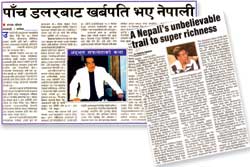 Business journalism failed Nepali readers and viewers in a big way last week. Giving front-page and prime-time treatment to the story of a Spanish-British-Nepali man, The Kathmandu Post and Kantipur national dailies, together with their affiliate Kantipur Television, gushed about how a certain Dr Rasendra Bhattarai left Kathmandu with a mere five dollars in his pocket-only to end up 22 years later with a villa in Madrid, properties in the US and Europe and a cool billion "in US dollar terms".
Business journalism failed Nepali readers and viewers in a big way last week. Giving front-page and prime-time treatment to the story of a Spanish-British-Nepali man, The Kathmandu Post and Kantipur national dailies, together with their affiliate Kantipur Television, gushed about how a certain Dr Rasendra Bhattarai left Kathmandu with a mere five dollars in his pocket-only to end up 22 years later with a villa in Madrid, properties in the US and Europe and a cool billion "in US dollar terms". To most sceptical Nepalis, parts of Bhattarai's self-reported biography must have sounded as though they were cribbed off a Jeffery Archer novel, if not from the life of Archer himself. But reading it and watching an exclusive interview of this hitherto anonymous 'billionaire', what struck me was not whether any of this man's claims regarding how he went about amassing wealth was true. Who knows, maybe he is indeed "a globally successful Nepali"-with a Palm Pilot that includes Bill Clinton's number, and a lifestyle that is at ease owning a Boeing Business Jet and a fleet of the world's fanciest cars. Or, maybe he just has a knack for making a living out of spinning stories for people who believe in fairytales.
Instead, what was odd was that all the news coverage was singularly packaged around Bhattarai's assertions about himself. None of the news about Bhattarai's various lucrative achievements was served to the audience after vetting it through reliable sources. In fact, so visibly charmed were the reporters that there was no background research to verify, corroborate, add to or contradict Bhattarai's enthusiastic take on himself. In front of a self-declared super-rich man, it seems to be all right to cast aside journalistic scepticism about the validity of a story, even when it appeared too strange to be true. In Bhattarai's case, in the absence of the verifiable truth, it was hard to tell where the non-fiction ended and the fiction began.
Though the news provided much entertainment and gossip for a few days, it served as a template to raise these questions: just what is the responsibility of a respectable private sector news organisation to its audience to whom it is, one assumes, connected through the bond of trust? Should the audience insist on getting nothing but the verified truth or should it simply shrug this off by saying that in Kathmandu's superheated dog-eat-dog media market-saturated with more than 10 broadsheet dailies, five homegrown TV channels, not to mention FM radio stations and so forth-sensation sells? Why care if rising up to the challenges of competition means that basic concerns about the truth are given short shrift?
The simplest answer is that no media exists in a vacuum in Nepal. Sure, in the short run, it can sex up the news. But the readers and the viewers-consumers whose trust any commercially-run media needs to survive for a long haul-get unfairly shortchanged in the process. The four results of serving half-baked stories that insult audience's intelligence are: the audience gets news that it learns to take with a dollop of salt, reporters' incompetence is exposed, media's misplaced corporate priorities become plain for opponents to take potshots at and even well-wishers like myself start to lose respect.
But all is not lost. In fact, thanks precisely to competitive market pressures, there still remains one clear way for Nepali media houses to differentiate their products from their competitors. And that is by reporting the truth in the old-fashioned way-by vetting and verifying it before serving it to the audience. Nepali readers and viewers deserve and demand nothing less. Failing that, let me tell you about this other billionaire who lives down the street . . .



